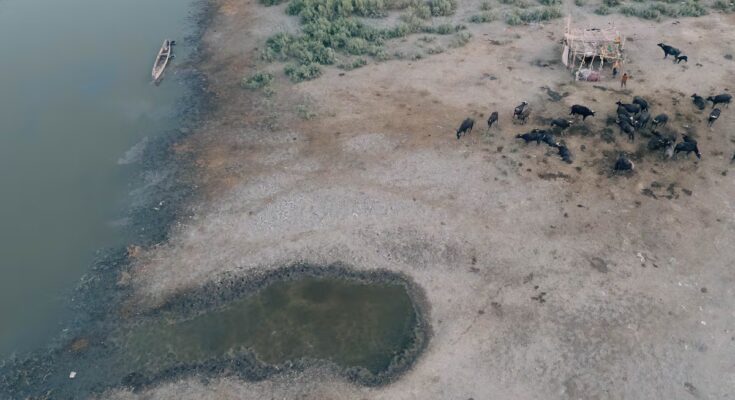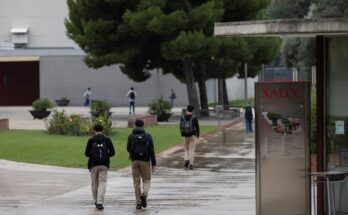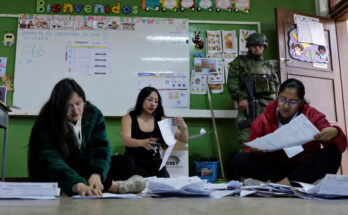“Look! We are all sad. Not only because many have lost their jobs or been forced into exile, but because the most precious thing we have is dying before our eyes.” Sitting cross-legged next to a dry canal in Chibayish, a small, desolate town on the banks of the Mesopotamian swamps, Haidar, 42, is desperate. Looking blank, this former fisherman says he has already stopped counting the relatives and neighbors who left as the waters receded. He hasn’t taken that step yet, but he is fully affected by the changes taking place. Coming from a family of fishermen, he had to abandon his profession. “Everything happened very quickly. In 2014 I left, like many men in the great south of Iraq, to fight the Islamic State, which threatened the country. When I returned three years later, the water level had dropped so much that, with a broken soul, I was forced to change my life. I felt as if I was betraying my ancestors, but I had no choice”, he comments in a flat, almost resigned voice.
Declared a World Heritage Site by UNESCO, the Mesopotamian marshes, born from the confluence of the Tigris and Euphrates in the heart of the Fertile Crescent, have protected a unique ecosystem and an ancestral lifestyle for centuries. Since Sumerian times, the Mad’an – the marsh Arabs – have lived there practicing fishing and breeding buffalo. A lifestyle that miraculously survived the deliberate reclamation of part of the swamps wanted by Saddam Hussein, at the beginning of the nineties, to repress the Shiite insurrection that broke out after the war between Iran and Iraq, but which has been facing new threats for a decade.
The figures are overwhelming. According to the United Nations, by 2023 around 70% of the marshes will have already dried up. As for the Mad’an, their number has been reduced by a tenth in forty years: far from the half million recorded at the end of the 1980s, today they would be no more than 30,000 or 40,000.
The reason: a general drying process, a product of the combination of global warming and Turkey’s large dam policy on the Tigris and Euphrates – the Güneydoğu Anadolu Projesi (GAP) project. An ecological disaster that does not come alone. The level of the Shatt al-Arab, the river that originates from the union of both channels and flows into the Persian Gulf, has dropped so much that the sea water, polluted up to the center, recedes along its channel and floods the swamps.
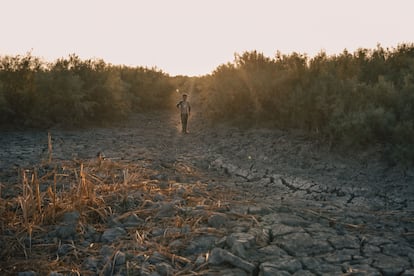
Despair and exodus
A few feet away, Rashan listens intently. This former fisherman also lost almost everything: without water there are no fish. From his home in Chibayish he observes the few tourists, members of NGOs or journalists, to whom he offers his profound knowledge of the place.
Out of modesty, avoid complaining. Their traditional boat, precariously rigged and equipped with a gleaming engine, continues to operate, unlike the dozens of abandoned boats cluttering the city’s canals. For Rashan, this is fragile mashof It was his work tool when fishing. Now it is their only source of livelihood.
He knows the swamps like the back of his hand: “There were entire villages inside the swamps; today they are abandoned. Even the city of Chibayish itself is emptied: whoever can should go to Basra or Baghdad”, he explains with resignation.
According to the United Nations, by 2023 around 70% of wetlands will have already dried up. As for the Mad’an, their numbers have been reduced by a tenth in forty years
Under a scorching sun – temperatures have approached 50 degrees all summer, exceeding it on several occasions – Rashan steers his boat, avoiding areas of exposed land. The water is both brackish and cloudy. The hull gets stuck in the mud several times. Here and there, the carcasses of buffaloes and cows emerge from the surface, traditionally bred in these wetlands, victims of extreme salinisation.
On the horizon you can see some reed huts: they are some of the last homes of the Mad’an. Haidar Wahid Ashem, 38, lives there with his cousin. Of the fifteen people who lived on that small island ten years ago, only they remained. “My father, my grandfather, my great grandfather lived here. This place is my whole life. Going to the city terrifies me. I have no education, what could I do there?” you ask.
As the sun sinks below the horizon, a herd of buffalo crosses the narrow channel in front of them. On the other side, a vast expanse of cracked earth cuts across the landscape. The sky is dressed in a thousand colors, a magical spectacle that contrasts with the tired faces of the Mad’an. “Since January, fifteen of my buffaloes have died, poisoned by the water. If this continues, I will have no alternative. I only survive thanks to them; the fishing ended a long time ago”, he tells us.
A few hundred meters away, another Haidar, forty years old, explodes: “The state not only does not put pressure on Turkey to leave us more water, but allows the oil companies established in the area to pump what little remains to produce their barrels. We are abandoned.”
The last sparks of the fire go out. Lying on makeshift beds, a few meters from their animals’ enclosure, the inhabitants sleep. The long Iraqi night has just begun.
For them it will be short. At dawn the Mad’an run: the buffaloes must be milked as soon as possible to sell the milk at the Chibayish market. Kamel, 33, is in a real race against time. “My income is decreasing because my buffaloes are dying one after the other. And the Government does nothing. The promised compensation has never arrived. My family has lived here for centuries but today I find myself in a dead end. Maybe I should resign myself, like everyone else, and go to the city. But I have no education, what would I do there?”
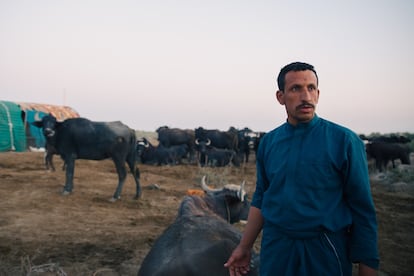
A little further away, among abandoned huts, you can see three houses. Zainab, wrapped in a dark niqab, and her husband Kamel also have little time. Having entered his 40s and helped by his cousin, he doesn’t hide his boredom: “Why talk? I’ve told my story ten times and nothing has changed; on the contrary, everything has gotten worse. Maybe it’s already too late: the cradle of humanity is dying silently.”
A few meters away, Alawi, 35 years old, with bright eyes and a kufiya green curled around the head, seems a little more talkative. He is accompanied by his cousins, aged five and eight. They are part of a new generation of Mad’an suspended above a few centimeters of water. “I hope I can end my life here, and that they can stay as long as possible,” he murmurs without much conviction.
The urgency of collapse
This break with the ancestral lifestyle also affected Raad el-Asadi, 38, whose family was forced to abandon the swamps when Saddam Hussein drained them. As a vindication of history, Raad has embraced the environmental cause. “The main culprit is Turkey, which has decided to deprive us of water, it is very clear. And also Iran, which has built dams in its part of the Shatt al-Arab. But the Iraqi state is also not free from blame: it does not exert any real pressure for the distribution of water. Until the situation changes, this heritage will slowly die. Perhaps it is already too late, because the evaporation caused by climate change is running out of us. In August we reached 58 degrees.” explains el-Asadi.
The man raises his voice: “The responsibility of the state in this ecological disaster is immense. Along the Shatt al-Arab, wastewater is discharged directly into the river. As its flow decreases, the putrid waters take up more and more space.”
The phenomenon is undeniable: in the canals that cross Chibayish the smell is sometimes unbearable. These criticisms earned el-Asadi a judicial proceeding brought by the Ministry of Water Resources, proof of the sensitivity of these issues in Iraq.
The responsibility of the State in this ecological disaster is immense. Along the Shatt al-Arab, wastewater is discharged directly into the river. As its flow diminishes, the putrid waters take up more and more space.
Raad el-Asadi
Dhay Hameed Mohsen, ecological activist, tries to raise awareness among the population about the challenges of the future, a difficult task in a country marked by decades of war and conflict. “The flow of water went from 600 cubic meters per second to around 200 in just a few years. There is no law that obliges Turkey to guarantee a stable and continuous quota,” he explains. “It all depends on their mood, and this constitutes a violation of human rights, because it directly affects the lives of thousands, even millions of Iraqis, depriving them of the right to drinking water,” he adds.
But cooperation is not forthcoming. According to concurring diplomatic sources, the Turkish authorities are refusing to sign a formal agreement and are limiting themselves to oral talks, also ignoring the UN Convention on Transboundary Watercourses.
Will a weak Iraqi state, corroded by corruption, be able to exert effective pressure on its neighbor? Fadi Comair, diplomat, negotiator and president of UNESCO’s Intergovernmental Hydrological Program, responds: “We need to find economic ground of mutual benefit. That’s why it is necessary to establish a water-energy-food-ecosystem nexus. Iraq, an oil country, could put this resource on the table. This is what the concept of hydrodiplomacy is about: going beyond water to build broader agreements.”
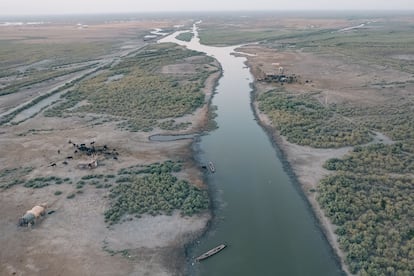
Would a hypothetical breakthrough by Ankara be enough to restore the balance? Nothing seems to indicate this, respond the activists consulted. “We must also take into account the internal mismanagement of water and the lack of adequate infrastructure to administer it. Even if Turkey gave us our share, this would not guarantee quality water. And this brings us to another point: pollution, the effects of which in Iraq are absolutely devastating,” insists Dhay Hameed Mohsen.
Iraqi scientist Nashat Biais accuses the “laziness” of the state, whose oil industry represents 90% of the national budget and maintains the practice of flared – the burning of gas associated with oil extraction – throughout the south of the country, including in swamps. “The consequence is that oil forms a thin film on the water that prevents the exchange of gases with the air, drastically reducing oxygenation. It suffocates fish and aquatic plants. Worse still, it infiltrates the aquifers through the soil, threatening drinking and irrigation water. Not to mention the effects on human and animal health,” he explains.
“Individuals alone cannot do much except raise the level of environmental awareness, rationalize water consumption or avoid throwing waste into rivers,” emphasizes Dhay Hameed Mohsen. And he concludes: “The main burden must fall on the Government. It is a question of survival.”
